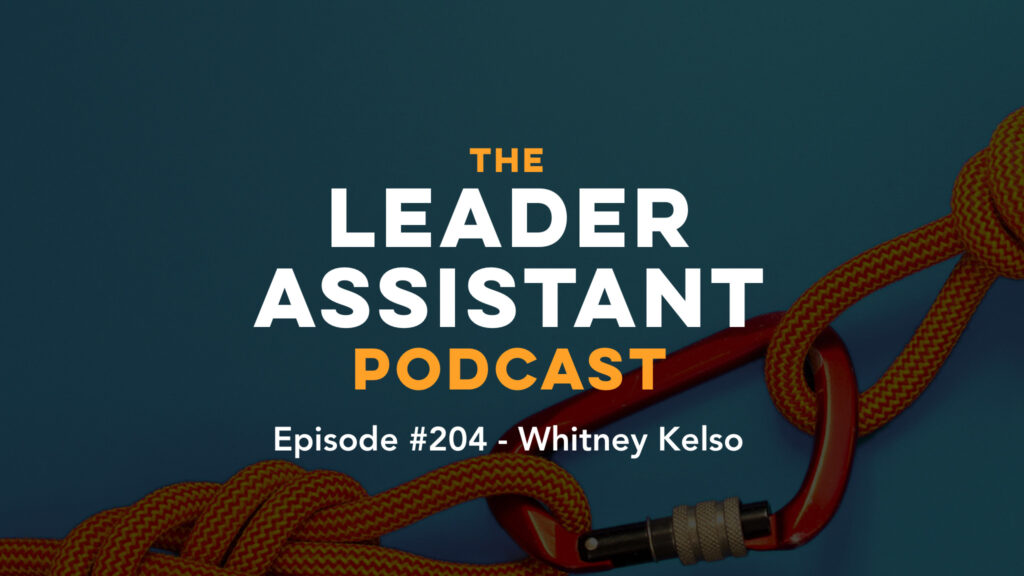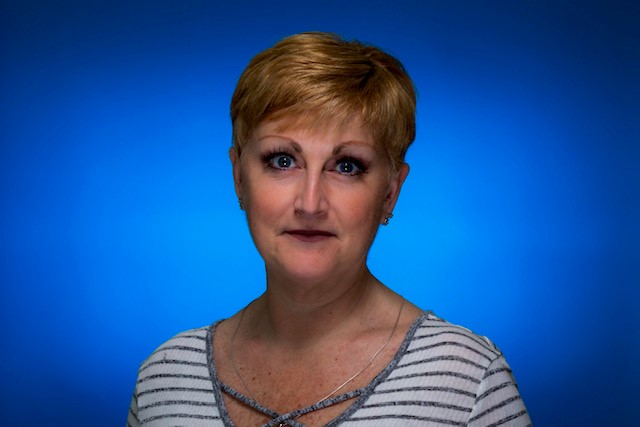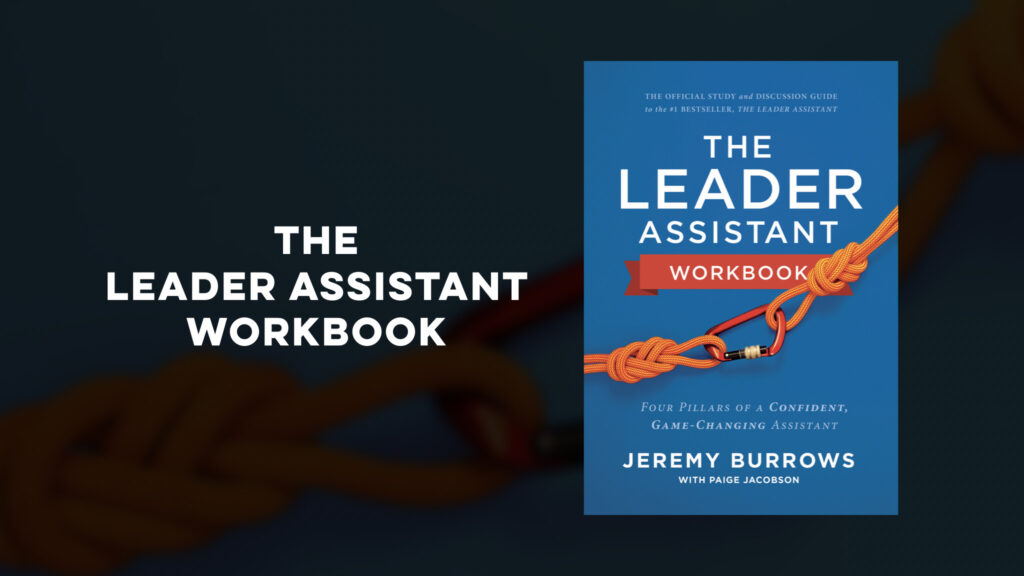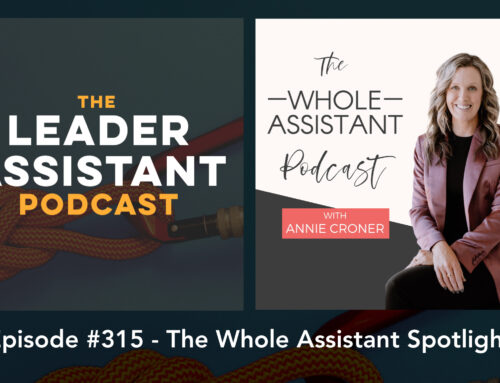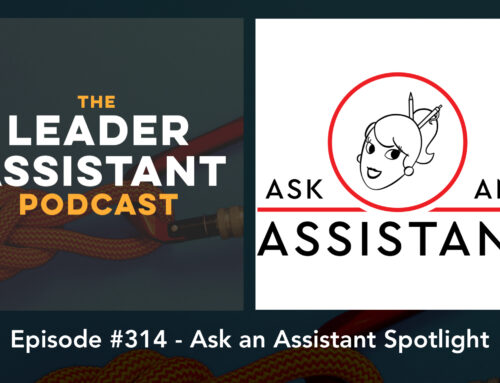Whitney Kelso is an Administrative Assistant II at one of the largest healthcare providers in the United States. She supports two Staff Vice Presidents and their leadership teams in the Global Chief Information Office.
In this episode, Whitney talks about networking with colleagues, professional development, setting boundaries, taking risks, and the influence and power that administrative professionals hold in the workplace.
LEADERSHIP QUOTE
Become the kind of leader that people would follow voluntarily, even if you had no title or position.
– Brian Tracy
CONNECT WITH WHITNEY
ABOUT WHITNEY
Whitney Kelso is an Administrative Assistant II at one of the largest healthcare providers in the United States. She supports two Staff Vice Presidents and their leadership teams in the Global Chief Information Office, and has been there for a little over five years.
Previously Whitney has worked in workforce development as both the Office Manager and the Business Service Assistant. Whitney has an extensive background in human resources, recruiting, and administrative support.
Originally from Los Angeles, California, Whitney holds her Bachelor’s Degree in Human Services/Public Administration. She has her CAP and Pace Certifications, with the Organizational Management and Meeting and Events Planning add-on certifications.
Whitney also serves as a committee member for the Governance and Leadership Committee for the International Association of Administrative Professionals (IAAP). She resides in Virginia Beach, VA with her husband and three crazy Australian Shepherds. Whitney has 3 bonus daughters she loves hanging out with and enjoys spending time with her husband and her horse.
THE LEADER ASSISTANT WORKBOOK
Do you have your copy of the official companion to the #1 Amazon bestselling book – The Leader Assistant: Four Pillars of a Confident, Game-Changing Assistant?
If you’re looking to maintain the status quo and be “just an assistant,” this workbook is not for you. However, if you want to dig deeper and learn to lead yourself, lead your team, and lead your executive, then it’s time to dive in to this in-depth and practical study and discussion guide.
Grab your digital, printable PDF copy of The Leader Assistant Workbook – a game-changing guide for executive assistants, virtual assistants, executive business partners, chiefs of staff, and administrative professionals.
PREMIUM MEMBERSHIP
To learn more about how you can join growth-minded Leader Assistants, check out the Leader Assistant Premium Membership for ongoing training, coaching, and community.
THE LEADER ASSISTANT BOOK
Download the first 3 chapters of The Leader Assistant: Four Pillars of Game-Changing Assistant for FREE here or buy it on Amazon or Audible.
LIVE EVENTS
Check out our constantly updated schedule of events for admins and assistants at LeaderAssistantLive.com. Including our all-day, online leadership workshop at leaderassistantlive.com/workshop.
JOIN THE FREE COMMUNITY
Join the Leader Assistant Global Community here, or the Facebook Group here for bonus content and to network with other assistants who are committed to becoming leaders!
SUBSCRIBE
Subscribe to The Leader Assistant Podcast so you don’t miss new episodes!
You can find the show on Apple Podcasts, Spotify, Google Podcasts, Pandora, and Stitcher.
Join my email list here if you want to get an email when a new episode goes live.
LEAVE A REVIEW
If you’re enjoying the podcast, please take 2 minutes to rate and review the show on Apple Podcasts here. Each review helps me stay motivated to keep the show going!
—
EPISODE TRANSCRIPT
Whitney Kelso 0:00
Hello, my name is Whitney Kelso. And today’s leadership quote is by Brian Tracy and it says become the kind of leader that people would follow voluntarily, even if you had no title or position.
Podcast Intro 0:16
The Leader Assistant Podcast exists to encourage and challenge assistants to become confident game changing leader assistants.
Jeremy Burrows 0:30
Howdy there. It’s Jeremy Burrows, your host of The Leader Assistant Podcast and I’m sure you’ve heard me talking about the leader assistant book. The subtitle is four pillars of a confident game changing assistant, and the book launched a couple of years ago, spin an Amazon best seller, and I’m hopeful that you’ve had a chance to check it out and read it. There’s an ebook version, there’s a paperback version. And there’s an audiobook version you can find out more at leaderassistantbook.com. But today I wanted to let you know in case you hadn’t heard, I also have a workbook. This is an in depth study and discussion guide for Game Changing executive assistants and Administrative Professionals. It’s the official companion to the number one best selling book the leader assistant. So if you’re looking to maintain the status quo, then this workbook is not for you. But if you want to dig deeper and learn to lead yourself lead your team and lead your executive. Then it’s time to dive into this in depth and practical study and discussion guide. So you can grab your digital printable PDF copy of the leader assistant workbook at leaderassistant.com/workbook. There’s also a link to the ebook version on Amazon if you don’t need a printable version. But yeah, leaderassistant.com/workbook Leaderassistant.com/workbook Hope you can check it out. Hope it helps you lead yourself lead your team and lead your executive. Hey friends, thanks for tuning into The Leader Assistant Podcast. It’s your host Jeremy Burrows and welcome to episode 204. You can check out the show notes at leaderassistant.com/204 leaderassistant.com/204. And today I have the pleasure of speaking with Whitney Kelso. Whitney is an administrative assistant to at one of the largest health care organizations in the US. And I’m really excited to dive in so Whitney, how’s it going?
Whitney Kelso 2:39
Doing great. Jeremy, thank you so much for having me.
Jeremy Burrows 2:42
What part of the world are you in?
Whitney Kelso 2:44
I am in Virginia Beach, Virginia, in the good old USA Bay.
Jeremy Burrows 2:49
Awesome. Awesome. Are you from that area?
Whitney Kelso 2:52
I am originally I kind of did a round trip. Visit here I was in Virginia Beach. And then I moved out to California and I landed right back where I am.
Jeremy Burrows 3:03
Nice, awesome. Well, what uh, let’s, let’s learn a little bit about you personally, Do you have pets or kids or hobbies or all the above?
Whitney Kelso 3:14
I have all of the above i i live in virginia beach with my husband. And I have three bonus daughters that are 2629 and 20. And I have three Crazy Dogs and one horse. So
Jeremy Burrows 3:32
what’s the horse’s name?
Whitney Kelso 3:33
His name is image. Image. He’s He’s my heart. Nice. Love it.
Jeremy Burrows 3:40
Well, I was actually I was actually born in Virginia. But I moved to Kansas City, Missouri when I was one. So I don’t really remember anything. But I have a special place. special place in my heart for Virginia.
Whitney Kelso 3:53
It’s pretty neat place. I like it.
Jeremy Burrows 3:56
All right, well, so tell us a little bit about your career. How did you end up as an assistant?
Whitney Kelso 4:05
Oh my goodness, quite by accident, as most of us say. But I’ve got a background in human resources, a background and in accounting, and workforce development. But in all of those has always had the assistant element to it. So you know, I’ve been an executive assistant at a church and did HR administration for another company and it’s just it’s just kind of come full circle and and I have found my niche and what I what I really love to do, and I kind of like being the leader on from behind and not from the front. This is kind of where I like to lead with the servant’s heart that I have. And so, you know, my bosses will tell you that I’ll just kind of go after everything. I’ll see an email and I’m like, I can take care of that. Like okay,
Jeremy Burrows 4:58
awesome. So how did you You know, what industry? Have you been in healthcare after that initial experience or what other industries I was.
Whitney Kelso 5:10
I was in workforce development for about 10 years, and I was the office manager and executive assistant for them. And then I moved into a business assistant role. So I work with local businesses on on the workforce and kind of marrying job applicants to this new employer that we’ve developed the relationships with, and tons of Job Fairs and things of that nature. I was also in human resources, doing pretty much managing human resources, there were two different organizations that were pretty small, certainly not the size of the company that I work for now. But I did that. And then I had a stint a long time ago, and I have no idea why I was there, because I’m horrible accountant. But I was in the accounts payable department. Looking back, I have no idea how that happened. That’s funny. 100 years ago, so
Jeremy Burrows 6:03
yeah, I was a start up. And you know, it was hard number one. And so the first year or so my CEO was like, Yeah, I’m gonna need you to run. Take care of HR slash people and accounting. And I was like, you know, I’m an introvert, and I’m not very good at math. So that was fun.
Whitney Kelso 6:25
I am 100%. On board with that.
Jeremy Burrows 6:29
Awesome, well, so tell us about. So I was also a pastor’s assistant, ministry assistant, nonprofit church assistant, tell us about the difference between the nonprofit and the private for profit world.
Whitney Kelso 6:50
It’s not as if obviously, it’s not corporate, it’s not huge. Everything is very, very small. Everybody knew everybody else’s business. And in a large corporation, you can choose you have your business out there or not. Right. So. So but but at the at the church, for example, and a technology company that I worked for, they were also a startup, it was just everybody knew everybody’s business, because they were so tiny, you know, and I remember at the technology organization, after hours, we would play video games, like more video games together. And so people would be in their offices, and they would we would all just hear people like shouting and yelling at their computers together. But you know, in this in this kind of the suite in the shopping mall, right? Looking back, I just said like, what, how did they do that? What Why did I do that?
Jeremy Burrows 7:40
That’s great. So do you enjoy the healthcare healthcare world?
Whitney Kelso 7:48
I do. I do. I support the folks who do like the architecture, and supporting the API’s, as well as another engineering departments. It’s like support to staff vice presidents. So they’re very, they’re the most intelligent people I’ve ever met, you know, and also the kinds of people that I’ve ever met. Even though it’s such a huge organization, everybody treats each other as family and of course, the culture of the company itself, you know, rolls downhill from the top. Right, so So we, you know, working for a larger organization was one of the things that I was terrified to make the move from all these little small organizations that I had always worked for. And, I mean, I think that the workforce office before I came over to, to my organization, had 22 people physically in the office. And that was the extent of us, right. And so here, you know, we have 112, over 112,000 people working for the company, worldwide and internationally. It’s, I was terrified to make that move, you know, and true. The first week or so I had to leave bread crumbs, if I had to use go use the ladies room, because the place was this enormous. And so I was a little bit overwhelmed there. But you know, now that I’m plugged in, and I’m networked in stuff, I, I work with the best administrative team on the planet, and I’m bragging, and I’m saying that but I am so proud of, of the group of us, I think there’s a little over 700 administrators are professionals at an organization and, you know, we share knowledge and we, you know, we keep people informed because nobody can know everything at a large organization like that. I have not run into some of the typical cliques that that inevitably do happen in some buildings and things of that nature. Because we have such an awesome group. It’s you can share freely, you can ask questions and not be looked down upon for not having the answer already. It’s it’s because everybody experienced this knowledge overload, you know, and it’s, it’s pretty amazing. I’ve never once had a really bad experience with any administration in an Administrative Professional here. It’s amazing.
Jeremy Burrows 9:54
That’s awesome. So let’s talk about networking and learning as that as you’re a part of that large team. So often, I’ve talked with assistance in large teams like that. And there sounds like you haven’t experienced much of this. But there can be silos and there can be cliques. And there can be, you know, we’ve been here doing it this way, and you get some new people coming in, and they’re not really feel welcome. But it sounds like you’re a part of a great team, and how do you? Or have you personally facilitated networking and professional professional development learning? within that group? Does everybody kind of pool their resources and budgets and ideas together to do group training and group networking opportunities? Or does it kind of split up based on region love to hear a little bit,
Whitney Kelso 10:49
I think that I think that bringing like a trainer in from the outside or something is something that I would love to do. But what we’ve got going on on the inside is we call it the administrative learning group. And so we meet once a week. And we have guest speakers, internal business partners that we that we work with all the time. So like travel and expense will come to a meeting once a month, right, so to give us the latest updates and the latest rollout so that we know what’s upcoming, and we can cascade that to our teams. Because they know, you know, our quote, unquote, power within his organization has kind of been discovered. And so people are asking to be part of these meetings, can I come and speak about XYZ? And it’s, you know, so we have, you know, in our president and CEO, has gotten wind of it and kind of knows who we are, which is really amazing, we think. But so we get together weekly, and I happen to be on the steering committee for this for this learning group. And so, you know, we’re also very, very tight, there’s about 20 of us. And it’s, you know, it’s just an honor to work with these people every single day. You know, even though we are a large organization, like I said, I have never experienced any kind of kind of clicky behavior at all.
Jeremy Burrows 12:02
That’s great. Yeah. How, how is it? Is it hybrid? Is it all in office? Is it a little bit of both?
Whitney Kelso 12:12
We are, obviously now, since we’ve gone through the COVID thing, we are now hybrid, I know that they want to have people back into the office as much as possible. But there’s like, for me, for example, where I’m located, I don’t have like the people I support are not in my region, they’re West, right. So there’s really no need for me to go in, because I’m not going to be supporting anybody there. If of course, they were having a meeting in our office, I would certainly go in there and help out and be there. And when I hear people within our entire organization that that might be in town for anything, I do go there to make sure that I can meet them and see them and see if there’s anything I can help with. But other than that, you know, I kind of stay upstairs in the bedroom with the dogs while I work. Yeah, you know, it is and it’s funny, you know, that I’ll go into the office, and I get really frustrated when I actually work in the office lucquin for social events. But I get so frustrated because the internet so slow. And I’m like I could have gotten all this work done by now. I just stayed home. But it’s the social aspect to this very important. Yeah.
Jeremy Burrows 13:25
So tell tell us a little bit about your title. So admitted, administrative assistant to did you start as that at this organization? Did you work your way up? And what’s kind of is there a career path?
Whitney Kelso 13:37
I did start with that. And basically, since we’re such a large organization, they base the title of the administrative support based upon the title of the person you support. So for example, I support my my direct line reports to a staff vice president so as an administrative assistant to that’s as high as I can go under, under them, people stay in administrative assistants whose for a long time because they have like a broad range. My my leaders are very, very good. If I if I want to go to like IW P summit or you know, or take take a class online or something, they’re very supportive of that, because they know I don’t think that they they really understand if it’s an administrative thing, but if I’m taking anything, my business acumen or anything like that, they’re they’re 100% for it, and then, but with administrative stuff, I think that they’re starting to see the value of it. But you know, they’re they’re also techies and you know, they, they deal with things that when I walked by their computers when I see them, I don’t even understand what’s on their screens. So
Jeremy Burrows 14:48
nice, nice. So, do you see the like, oh your for your for you personally. For your career, are you like excited to be in this level, if you will, an administrative assistant to for a long time? Do you have like goals and aspirations? Do people ask you even, you know, friends and family? Oh, when are you going to do the next thing? Or what’s next for you?
Whitney Kelso 15:22
Sure, yeah, I do get asked that quite a bit. But as as Administrative Professionals, I think that we all realize that the fit between the admin and the executive is super important and is key into the success of the relationship. And, you know, so if I do hear of a position that’s open, and I know who the person is, and I know how they are, I may or may not be interested in that. You know, so, you know, now that I have more knowledge of the people in the company, but it’s, you know, so I have to consider the people that I work for, and I work for two of the most fabulous guys. Right, so, so that that and their teams just keep me so rooted, because we’re also close. And it’s and it’s really just easy working relationship. You know, they they reach out to me all the time, of course, and I’m, of course, I, I do a lot of follow through on deliverables for them. You know, so it’s just, we kind of all know each other, right? So for me to make a change from that, I would either follow my boss, if he if he got promoted to a vice president, or I would, you know, I would really have to heavy heavily consider who I would be supporting, right. So I would just have to make sure that we’re a good fit. And usually in an interview, when you’re talking to them, you’re interviewing them right back, right. So you can tell if they’re, if they’re harsh, or if they’re some kind of way that that just messes with your insights, right? If you if you have to deal with that every single day. So if it’s something like that you can walk easily away, and then not accept that position? Because it is a two way street interview. Yeah.
Jeremy Burrows 17:04
So you mentioned earlier, this idea of having a servant’s heart and wanting to help and how do you balance that with setting boundaries and being you know, avoiding burnout?
Whitney Kelso 17:18
Oh, that is such a great question. And that is just my theme of 2022. I was doing, I am involved with so many committees and so many ambassadorships because I just wanted to have my hands on everything, right? both at work and outside of work, right. So. So I kind of hit the brick wall in, in April, when I had a semi workload put on me, in addition to what I already do, and I just was like, You know what, something’s got to give, or I’m going to end up in the loony bin. So I really had to start setting hard boundaries. And and so I felt when I do it, I feel mean, because I’m so used to being the Yes girl saying, saying, Sure, I’ll help you with that. And then like, adding it to the list and staying later at night and everything. And then and then it got to the point where I was like, you know, what, if I don’t have anything to give, I’m not gonna serve these guys the way that they need to. But I say guys, as all encompassing, because obviously there’s men and women on the team, but, you know, I serve them with my servant’s heart, but I can’t take so much on that I’m going to become resentful of what I do for them. Right. So so I really had to kind of hit hard boundaries. And, and you know, I do work a little bit late sometimes. But if people try to contact me after 530, I generally don’t respond back, I have like a message on my outgoing email about, you know, that we’re in a digital world. And so it’s really easy for people just to get online at midnight and expect a reply and stuff. But since we are so digital, you know, there’s other important things in life like family and hobbies and things like that, so that you can clear your head so that you can come back and you could focus but I was I was at the point point when I hit that brick wall where I would look at my to do list and it’s like, all of the words would like just become soup, and I just I couldn’t where do I start and something that’s so simple and so natural and so automatic for me? It scared me it really did. I was like, oh my god, I can’t even make a decision. And so I really had to like step back and look at that and and you know in this was like a period of time in the beginning of last year. So we have the Ukraine stargazing and all that kind of stuff. So everything I was just on overwhelmed. And so I had to, I had to give myself permission to not sit at my desk and not move for eight and a half hours right to it’s okay, get up and take a walk. You know, that’ll clear your minds. And as soon as I started seeing the benefits of that I’m like, Oh yeah, let’s get some more of that going on. You know, but it’s, it’s a matter of also getting to know myself and my limits and, you know, 52 years old, I just don’t have the time for some or the patient As for some of this stuff, so I have to, I have to kind of really pick and choose the things that I become involved with, right? So there, I’m involved with one ambassadorship that I really haven’t participated in, in like the last two years, because it’s over and above everything, but it’s good knowledge to have for the business. So I keep that ambassadorship. But but I just have not active, you know, but, you know, I pick the important things to me, and that is a culture. So I’m an ambassador for culture at our company, and I am also we have recognition awards. So I’m an ambassadorship for that program. And so, you know, get all the information ahead of time, and it’s just really nice to be able to pass that on to the team, because FYI, you know, so. So I’ve had to drop things, so that I didn’t have that those extra stressors. So it’s, it’s still a year of growth and time of getting to know myself, I guess, again, but it’s actually been really good. Because I think that that’s we have to go through kind of that kind of stuff to grow, you being uncomfortable and stretching was part of it.
Jeremy Burrows 21:12
So have you had any? I assume your team has been supportive? Or have you had any pushback on like, whoa, you know, since you’ve tried to set those boundaries?
Whitney Kelso 21:25
No, because I think that because I’ve got the support of my SPPs. There they are in my corner. And so when I broke down and told them that I had hit this brick wall, and they knew about it, they’re like, oh, my gosh, I had no idea because I was just doing everything, how to do everything, and I’ll be fine along And I’ll be fine. And then and I ended I, I wasn’t. So but it’s just been an incredible year, because of getting to know myself and my limitations and when to say no, and when to, for me to say I’ve just got to walk away, you know, and I would just ping them on teams, but say, hey, I need to take a couple of hours here, I’ll be, I’ll be fine. But I’ll be back. You know, and they’re always fine with it, you know, I always take my cell phone with me. Although I, if I go to like see the horse or something like that, for my sanity time, I’ll leave the cart in front of the car, you know, so because that’s kind of my sanctuary. So it’s, it’s, you know, so I know what I need when I get to certain points.
Jeremy Burrows 22:26
That’s great. Well, Whitney, this has been great. I want to I want to talk a little bit about leaders and how Administrative Professionals slash assistants are leaders. And a little bit about the influence and the power that we hold. You mentioned, you’re an ambassador on the culture, team. And so tell us a little bit about that. And how do you how have you seen or what are other ways you’ve seen yourself and your administrative professional colleagues and friends embody the influence and in power, even in leadership that we hold?
Whitney Kelso 23:06
Well, you know, I’ll start with the power and its power that you have to know that you have but not wield it, because I’m not in a position to wield any power, right. But I see things that most people don’t see, you know, and so I’m privy to information that some people are not privy to. So so there therein lies power that’s there. But I also have the absolute ear of my executives, you know, I can contact them at any time. And they’re always responsive to me and and, you know, people know, that, that if I can make time in the schedule for stuff, I think that I, I have a real reputation because I try to hold time for my executives like told, you know, they have like a bio break, they have lunch they have make it take a walk, because they’re in back to back to back to back meetings. So I think that they know that I do this hold on. And so they contact me and say, Hey, is there any way I can squeeze X amount of time into see so and so and, and they know that I can try to make things work, you know, and so, but it’s still I’m the gatekeeper of the times and I know that my LinkedIn says I’m a compassionate gate gatekeeper. But sometimes I’m really selfish with their time because, you know, I don’t want them to become sick because they’re just back to backs and they never get any breaks, you know, and stuff so so you know, I’m very protective of them. You know, it’s like, I feel like I need to go before them with a sword and a shield just to say, what’s coming out of now and and oh, okay, you’re good. You can come through. But but it’s but it’s also it’s also. So its power not to be wielded, but to know that you have but on the other note, you know, we we need to be visible. We need to be seen and so that so that people know our value, because I we’re not we’re not in that. That mood nine to five with Dolly Parton. We’re not in there anymore. So it’s It seems people with minds out there, they have ideas and they want to implement their ideas and and I’ve had ideas that have flown and I have had ideas that flopped. But my bosses know that I will I bring it up and go, Hey, what do you think about this? You know, or what about this idea for a fun meeting, you know, and so I’m doing two of those tomorrow. It’s, you know, so it’s nice to be able to have their ear and they’re really great leaders, you know, so, so, if I’m not doing a quick check in and I’m having a serious talk with them, I mean, they I bleed a lot of knowledge from those guys. It’s amazing. You know, sort of have to have that the seat at that table, you know, and to be able to sit until in leadership meetings with your organization’s and be heard. Not just listened to and then poo pooed. But but really heard and what they’re like, Yeah, that’s a great idea. You know, it’s it’s, it’s kind of an honor, you know? Yeah. That’s the way I look at it.
Jeremy Burrows 25:59
I agree. 100%? Well, Whitney, what’s the what’s the one thing you know, that you would like to leave with? Assistants listening now you’ve got assistants who love their job, you’ve got assistants who hate their job listening, you’ve got assistants who are brand new, or a month, two months, three months on the job, never been an assistant before. And then you’ve got assistants listening that have been assistants for 30 years? What’s What’s one thing that you’d like them to take away from our conversation.
Whitney Kelso 26:31
I would like people to know that they can reach out for help, and that they’re appreciated. They are powerful in and of themselves. But Eleanor Roosevelt once said, do one thing every day that scares you. And, to me, that means you know, take on challenges, take on stretch assignments, take on volunteering, and we’re burning something new that you can bring back to the organization or your company. Because then that is what makes you invaluable, because that’s Knowledge is power. And and nobody can take it from you. So you can you can take it into a future life, you can take it into your current life. It’s it’s an amazing thing to have, and be thirsty for.
Jeremy Burrows 27:15
Love it. Well said Whitney, well, if people want to reach out and ask for help, or say hi, connect with you, what’s the best way for them to get a hold of you?
Whitney Kelso 27:27
Well, I do have my LinkedIn. And you’re welcome to publish that with the podcast. That’s totally fine. And I’m on Facebook and everything too. So but primarily LinkedIn would be the best way you know, and then then they’ll see who I work for their
Jeremy Burrows 27:43
sounds good. Sounds good. Well, I’ll put I’ll put that in the show notes for sure. People can reach out and say hi, leaderassistant.com/204 leaderassistant.com/204 for the show notes and Whitney’s bio in LinkedIn and all that it’ll be on there. Whitney, thanks so much for being on the show. Best of luck to you and your dogs and your horse and your kids and everything else.
Speaker 1 28:10
Jeremy, thank you so much for having me. And thank you for all that you have done for this leader assistant community in empowering us and and backing us. It’s just been amazing. And I think that your book is kind of used as the assistant Bible. So thank you very much for being here.
Unknown Speaker 28:37
Please love
Podcast Intro 28:37
you on Apple podcasts.
Goburrows.com

